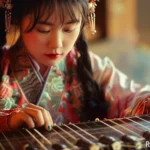China is a country rich in history and culture, with festivals that reflect its vibrant traditions. For foreign tourists, experiencing these traditional Chinese festivals can be an unforgettable part of their trip. This guide will introduce you to some of the most significant traditional Chinese festivals, their origins, customs, and the best ways to participate.
Chinese New Year (Spring Festival)
Chinese New Year, also known as the Spring Festival, is the most important festival in China. It marks the beginning of the lunar new year, usually falling between late January and mid-February.
The festival has a history of over 4,000 years. It is believed to have originated from ancient celebrations to mark the end of winter and the start of spring. Key customs include family reunions, feasting, giving red envelopes (hongbao) with money, and setting off fireworks.
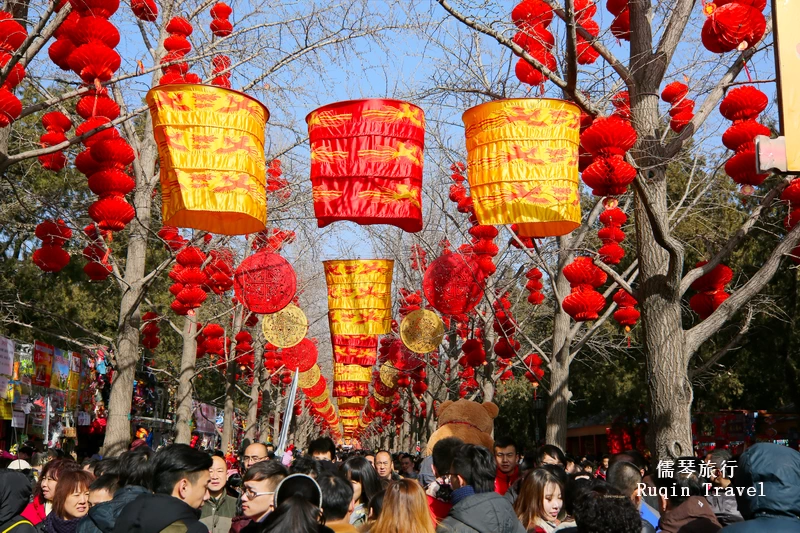
During Chinese New Year, cities and towns across China are decorated with red lanterns and banners. Visitors can enjoy traditional performances like dragon and lion dances. Additionally, you can join the locals in their celebrations, attend temple fairs, and taste special festive foods such as dumplings, rice cakes, and fish.
Lantern Festival
The Lantern Festival is celebrated on the 15th day of the first lunar month, marking the end of the Chinese New Year festivities.
Dating back over 2,000 years, the Lantern Festival involves lighting and displaying lanterns, solving riddles written on them, and eating tangyuan (sweet glutinous rice balls). These activities symbolize the reunion and harmony of families.
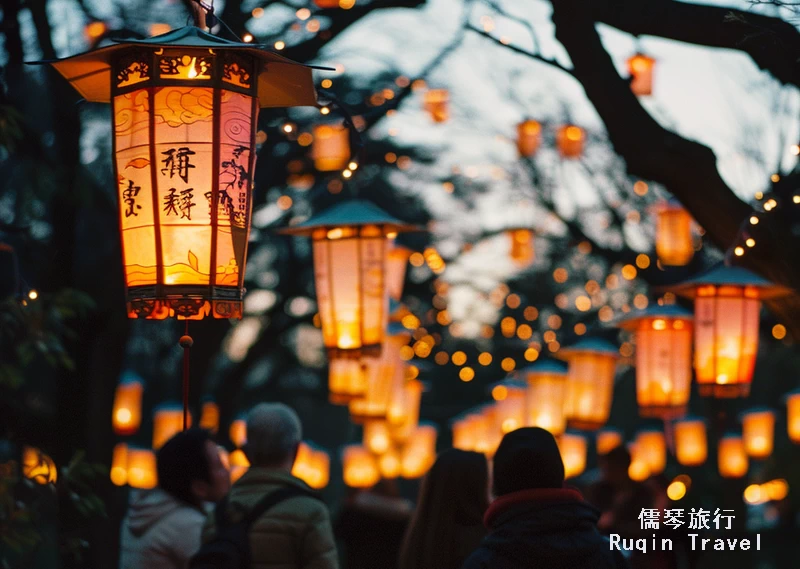
To experience the Lantern Festival, head to a local park or a temple fair. You will find beautifully crafted lanterns in various shapes and sizes. Join the locals in solving lantern riddles and savor tangyuan, which signifies family unity and happiness.
Qingming Festival
The Qingming Festival, or Tomb Sweeping Day, usually falls on April 4th or 5th. It is a time for Chinese people to honor their ancestors by cleaning their graves and making offerings.
The festival has been observed for over 2,500 years. Families visit the graves of their ancestors, clean the tombstones, and make offerings of food, tea, and paper money. This practice shows respect for the deceased and keeps their memory alive.
Visitors can witness these traditions at cemeteries and ancestral tombs. Additionally, Qingming is a time for outings and enjoying the spring scenery. Many Chinese people fly kites, which is another popular activity during this festival.
Dragon Boat Festival
The Dragon Boat Festival, or Duanwu Festival, occurs on the 5th day of the 5th lunar month, usually in June.
This festival commemorates the death of Qu Yuan, a famous poet from ancient China. People celebrate by racing dragon boats, eating zongzi (sticky rice dumplings wrapped in bamboo leaves), and hanging medicinal herbs to ward off evil spirits.
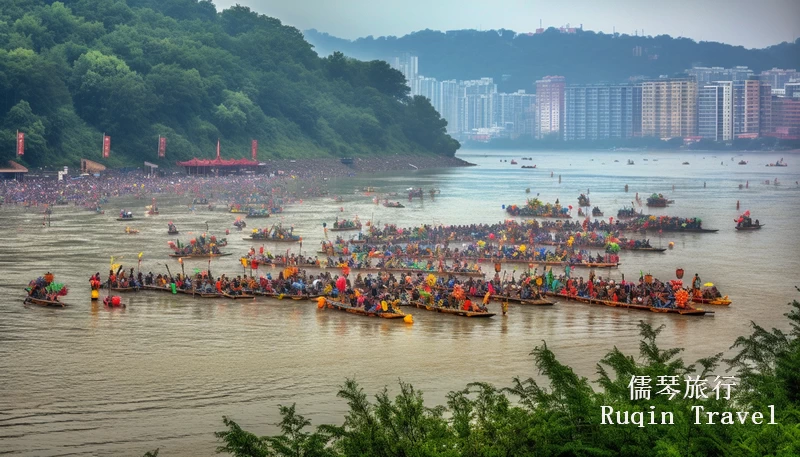
To experience the Dragon Boat Festival, visit cities like Hangzhou or Guangzhou, where you can watch or even participate in dragon boat races. Don’t miss trying zongzi, a traditional food that comes in various flavors, both sweet and savory.
Mid-Autumn Festival
The Mid-Autumn Festival falls on the 15th day of the 8th lunar month, usually in September or October. It is a time for family reunions and moon gazing.
With a history of over 3,000 years, the festival is associated with the legend of Chang’e, the moon goddess. Customs include eating mooncakes, lighting lanterns, and appreciating the full moon, which symbolizes reunion and harmony.
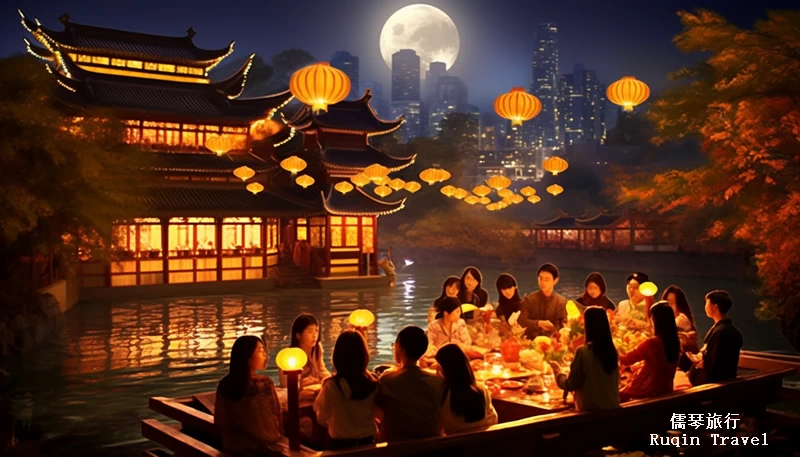
Join the locals in moon gazing and lighting lanterns. You can also taste a variety of mooncakes, which come in many different flavors, including sweet, savory, and even modern twists like ice cream mooncakes.
Double Ninth Festival
The Double Ninth Festival, also known as Chongyang Festival, is celebrated on the 9th day of the 9th lunar month.
This festival has been celebrated for over 2,000 years and is a day to honor the elderly. Customs include climbing mountains, eating chrysanthemum cakes, and drinking chrysanthemum wine.
If you are in China during the Double Ninth Festival, consider hiking in the countryside or visiting parks with the locals. Enjoy the seasonal foods and take part in activities that celebrate longevity and health.
Experiencing Chinese Festivals
Timing Your Visit
Timing your visit to coincide with these festivals can enhance your travel experience. Plan ahead and check the lunar calendar for specific dates.
Participating Respectfully
While participating in these festivals, it is important to respect local customs and traditions. Observe and follow the lead of the locals, especially during solemn events like the Qingming Festival.
Engaging with Locals
Engaging with locals can enrich your festival experience. Many Chinese people are proud of their traditions and are happy to share them with foreign visitors. Don’t hesitate to ask questions and join in the celebrations.
Traditional Chinese festivals offer a unique window into China’s rich cultural heritage. From the vibrant Chinese New Year to the serene Qingming Festival, each celebration provides a different perspective on Chinese customs and values.
By participating in these festivals, you not only learn about Chinese culture but also create unforgettable memories of your trip. So, plan your visit around these festive times, immerse yourself in the local traditions, and enjoy the cultural richness that China has to offer. Check China Cultural Insights for more information.
More China Cultural Insights
China is a country full of rich traditions, colorful festivals, and fascinating customs that have been passed down through generations. At China Cultural Insights by Ruqin China Travel, we want to help you experience the real China by understanding its culture.


